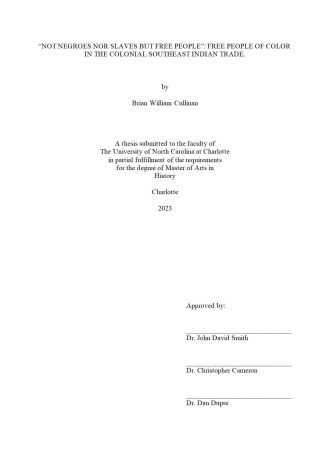NOTE: THIS WEBSITE IS A WORK IN PROGRESS. RESOURCES AND DATA ARE ADDED DAILY.
IMPORTANT: We are in urgent need of funding to keep this project alive and ensure its future. If you’re enjoying the site and see our vision for the project, please consider joining as a paid member or contributing to our crowdfunding campaign today. It is only with your help that we can continue this work.
Thanks so much for your support! – Jes
![]()
0
“Not Negroes nor Slaves but Free People”: Free People of Color in the Colonial Southeast Indian Trade
Resource ID: 74166
Type: article, thesis (student)
share:
- UPDATED: 6.29.2025
- status: to be worked, high-priority
- Peoples, Black History, Mixed Ancestry Peoples, Indigenous History, History
- Free Persons of Color, Indian trade
Info + Help
– Many of the article links in our Resource Center lead to the JSTOR website, where you’ll be asked to sign in. If you don’t have a JPASS subscription or an account through your institution, you can register for a personal account and read up to 100 articles/month for FREE!
– After launch, I’ll be adding more articles and documents that can be viewed/downloaded for free.
author:
Brian William Cullinan
DOI:
n/a
date:
2023
pages:
306
abstract:
This thesis examines the role of free people of color in the colonial Indian trade in England’s southern American colonies, primarily Virginia and the Carolinas, from the 1640s to that trade’s decline in the colonial southeast by the early 1770s. Free people of color participated in the Indian trade throughout the colonial period in substantial numbers, and sometimes became that trade’s principal actors. At a time when race-based laws and prohibitive social conditions emerged alongside the development of southern slave society, the Indian trade—operated largely by a colorful cast of adventurers who often worked outside the reach of colonial government—offered free people of color unparalleled opportunities for economic and social ascendancy in a world increasingly shut off to them due to the inhibiting matters that attended their race. This thesis additionally examines how the geography of the Indian trade provides a key for understanding the movement of free people of color across the southern colonial frontier, as well as the isolated multi-racial communities they developed along their journey.
places:
peoples:
CMOS:
author-date:
Other Resources
- An Overview of the Phenomenon of Mixed Racial Isolates in the United States
- Virginia Negro Soldiers and Seamen in the American Revolution
- A Question of Indian Identity in the Plecker Era: The Monacan Indian Nation in the Twentieth Century
- The Melungeon Identity Movement and the Construction of Appalachian Whiteness
- Mixing in the Mountains
- The Melungeons: Red, Black and White in the Old South

